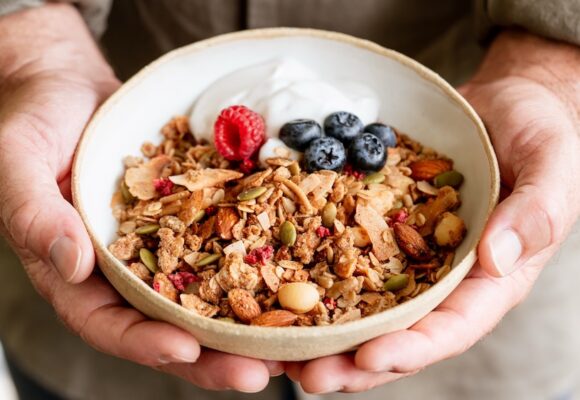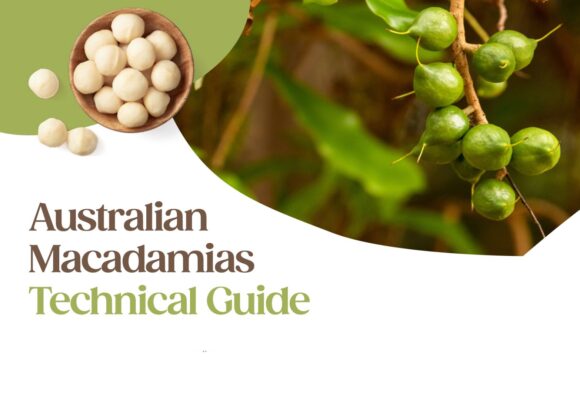In a world where dietary trends fluctuate, one fact remains steadfast: nuts are a nutritional powerhouse, offering a medley of flavour, texture and health benefits. Despite their culinary allure and proven advantages, a lingering misconception persists – the unfounded notion that nuts contribute to unwanted weight gain. However, a host of recent scientific research has debunked this myth.

Nuts for Life, Australia’s leading authority on the nutrition and health benefits of nuts, recently published a summary of the scientific evidence related to nuts and weight management. In an associated webinar, Alison Coates, Professor in Human Nutrition and Dean of Research in Allied Health and Human Performance at the University of South Australia, unpacked the latest scientific research related to nut consumption and its impact on weight.
The resounding conclusion? Despite the fact they are energy dense, populations that regularly consume nuts have less weight gain and a lower risk of obesity.
Here we delve into the wealth of evidence drawn from global studies, highlighting the imperative for food and healthcare professionals and consumers to embrace the role of nuts in fostering optimal weight management.
Multiple studies confirm: nuts do not lead to weight gain
Prof Coates says that as scientific evidence grows, the strength of this conclusion becomes increasingly apparent, as does understanding of the nuances that lie within the nut-weight relationship.
“Nuts possess an inherently healthful profile,” Prof Coates asserts. “Despite their energy density and high fat content, which are primarily the healthy mono and polyunsaturated kind, the accumulating body of evidence resoundingly demonstrates that eating nuts does not cause unwanted weight gain.”
Highlighting pivotal studies reinforcing this conclusion, Prof Coates shared a series of powerful key findings.
- Eating nuts is associated with lower risk of being overweight or obese, and people who regularly consume nuts maintain a more consistent weight compared to non-consumers. These were the conclusions of a 2021 observational study amalgamating data from six prospective cohorts across Europe and the USA.[i]
- People who fall into the highest quartile of nut consumption exhibit significantly less weight gain over a five-year period compared to those who don’t eat nuts, according to a large European study known as the EPIC Trial.[ii]
- Nut consumption has no adverse effects on body weight, BMI, body fat or waist circumference and in fact, higher nut intake is associated with reduced body weight and body fat. These were the findings of a comprehensive 2021 research review encompassing data from 86 randomised control trials.[i]

New study scrutinises the impact of nut inclusion on weight loss outcomes
In light of the compelling evidence dispelling the myth of nut-induced weight gain, Prof Coates and her research team turned their attention to what happens when people who are actively trying to lose weight include nuts in their diet.
“We wanted to explore what happens if we include nuts in an energy restricted diet – would we still see the same amount of weight loss or would results be compromised?” Prof Coates explains.
To address this, they conducted a scoping review[iii] of randomised control trials employing calorie restriction protocols to induce weight loss, allowing for direct comparisons between diets with and without nuts.
“We isolated seven trials that included a broad range of calorie restrictions and durations of between 4 weeks and 52 weeks. There were also different types of nuts included and people were consuming more than the suggested daily serve of 30 grams, typically ranging between 1.5 and three serves,” says Prof Coates.
The review observed weight loss in all of the trials and concluded that nuts did not limit weight loss in any of the studies. In fact, significantly greater weight loss was seen when nuts were included in the diet in four out of the seven trials, confirming that nuts have the potential to enhance weight management strategies.

So how do they do it?
Turning to how nuts can deliver favourable weight outcomes, there are multiple mechanisms at play. Some of the main ones are:
- Nuts are an energy-dense food rich in protein and fibre. This makes them highly satisfying. Prof Coates reports that people have an enhanced satiety response when they consume nuts. If people feel less hungry, this may prompt a reduction in overall calorie intake.
- They require substantial chewing. The chewing action required to break down nuts before swallowing activates signalling systems in the body that may trigger a feeling of fullness.[iv]
- Diet quality and food displacement. Data shows that nut consumers score better in terms of diet quality than non-consumers.[v] [vi] Prof Coates has found both in her research and from other studies that when nuts are added or swapped out for other less healthful snacks, people’s overall diet improves.
- Lower than predicted metabolizable energy. In short, this means our bodies absorb less energy from nuts than the number of kilojoules or calories stated on pack, by up to 26%.[vii] Prof Coates says it’s thought that when people consume nuts in their whole form, it’s difficult for the human body to extract all the energy from them as the fat is trapped within the cell walls.[viii] ‘This reduced digestibility of the fat in nuts, leads to reduced kilojoule absorption,” she explains.
- Nuts are delicious and desirable. Research has shown that weight management plans that include nuts are seen as more enjoyable, resulting in people complying with the plan for longer.[iv]
Closing the gaps
The confusion that still exists around nut consumption and weight gain is feeding two significant gaps: one with health professionals and another with consumers.
Recently, healthcare professionals in Australia were surveyed about their knowledge and perceptions around whether nuts should be consumed for health and weight management.[ix]
72% said that nuts should be included in the diet daily and 68% of dietitians/nutritionists advised some clients to eat more nuts. But when it comes to weight management and whether eating nuts causes people to gain unwanted weight, the responses were mixed, showing more work is needed to educate the health sector on the science behind nut consumption and weight management.
At the consumer level, while the health benefits associated with nut consumption are well known and nut intake guidelines are communicated globally, most people’s intake is falling short of recommended levels,[x] with the ‘weight barrier’ considered a major roadblock to higher consumption.

Australia illustrates this perfectly. Nuts appear in the protein rich food category in the Australian Guide to Healthy Eating[xi] and the recommended daily serve is 30 grams – around 15 macadamias. Yet we know that in Australian adults:[xii]
- Average nut consumption is only 4.6 grams
- Around 60% do not eat any nuts at all
- Only 2% meet the daily 30 gram target
The impacts of this under-consumption are profound. Australian modelling data shows that if more people ate nuts, health would improve at a population level. It’s estimated that raising the nation’s consumption to the recommended 30 grams per day would reduce healthcare costs by at least $980million AUD, based on cost savings related to cardio-vascular disease and cancer alone.[xiii]
Expanding the compelling suite of health benefits
The pivotal role of nuts in weight management adds another layer to their already impressive array of health benefits. As nutritional powerhouses full of healthy unsaturated fats (macadamias contain the most monounsaturated fat of all tree nuts), they’re a shelf-stable and convenient source of plant protein, dietary fibre, key vitamins and minerals, as well as polyphenols, phytosterols and carotenoids.
In addition to enhancing diet quality, nuts contribute to cardiovascular health, metabolic well-being, gut function, brain health, and cognitive performance.
The collective body of scientific literature emphatically validates the role of nuts in healthy dietary patterns, dispelling any lingering doubts regarding their contribution to effective weight management.
To learn more, see the Nuts for Life Summary of Scientific Evidence or contact Australian Macadamias Market Development Manager Jacqui Price.


